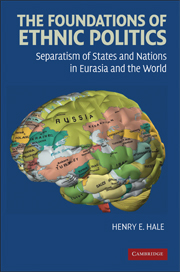Book contents
- Frontmatter
- Contents
- Acknowledgments
- Note on Transliteration
- 1 INTRODUCTION
- Part I Theory with Worldwide Examples
- Part II Case Comparisons: Separatism in Eurasia
- 5 ETHNICITY: IDENTITY AND SEPARATISM IN THE USSR 1917–1991
- 6 CENTRAL STATE POLICIES AND SEPARATISM
- 7 FRAMING: MANIPULATING MASS OPINION IN UKRAINE AND UZBEKISTAN
- 8 INSTITUTIONALLY MEDIATED INTERESTS: THE POLITICAL ECONOMY OF SECESSIONISM
- 9 ETHNICITY AND INTERNATIONAL INTEGRATION: THE CIS 1991–2007
- 10 QUANTITATIVE EVIDENCE: MICRO-, MACRO-, AND MULTILEVEL
- Part III Conclusion
- Index
- Other Books in the Series
- References
10 - QUANTITATIVE EVIDENCE: MICRO-, MACRO-, AND MULTILEVEL
Published online by Cambridge University Press: 05 September 2012
- Frontmatter
- Contents
- Acknowledgments
- Note on Transliteration
- 1 INTRODUCTION
- Part I Theory with Worldwide Examples
- Part II Case Comparisons: Separatism in Eurasia
- 5 ETHNICITY: IDENTITY AND SEPARATISM IN THE USSR 1917–1991
- 6 CENTRAL STATE POLICIES AND SEPARATISM
- 7 FRAMING: MANIPULATING MASS OPINION IN UKRAINE AND UZBEKISTAN
- 8 INSTITUTIONALLY MEDIATED INTERESTS: THE POLITICAL ECONOMY OF SECESSIONISM
- 9 ETHNICITY AND INTERNATIONAL INTEGRATION: THE CIS 1991–2007
- 10 QUANTITATIVE EVIDENCE: MICRO-, MACRO-, AND MULTILEVEL
- Part III Conclusion
- Index
- Other Books in the Series
- References
Summary
The preceding five chapters have employed a carefully chosen set of qualitative methods, including illustrative focused comparisons involving Ukraine and Uzbekistan, to demonstrate how a relational approach to ethnicity can improve our understanding of the totality of events related to former Soviet republics' separatist behavior. One might still wonder: Would a systematic study of more ethnic regions confirm the patterns that seem evident when the focus is on Ukraine and Uzbekistan? And even though earlier chapters have discussed public opinion survey findings, readers may yet ask: Would a more rigorous analysis of such figures – one introducing relevant control variables – still support the theory in comparison with its rivals? Ideally, the answers would be linked: Would appropriate quantitative techniques bear out this volume's claim that there actually was a connection between what was happening at the level of the republics and what was going on at the level of individual opinion?
There is good news and bad news here. First, the bad news: Because the events of primary interest took place in 1990–1, we cannot go back in time to collect the ideal data that would allow us to dismiss these concerns with complete confidence. The good news, though, is that there are at least some data available. And even though many of these data were not collected specifically for this purpose and are often far from ideal, they are of sufficient quality to weigh significantly toward or against accepting the rival theories under discussion here.
- Type
- Chapter
- Information
- The Foundations of Ethnic PoliticsSeparatism of States and Nations in Eurasia and the World, pp. 216 - 238Publisher: Cambridge University PressPrint publication year: 2008



